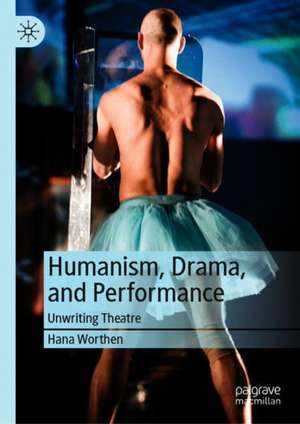Humanism, Drama, and Performance: Unwriting Theatre
Autor Hana Worthenen Limba Engleză Hardback – 14 oct 2020
This book examines the appropriation of theatre and theatrical performance by ideologies of humanism, in terms that continue to echo across the related disciplines of literary, drama, theatre, and performance history and studies today. From Aristotle onward, theatre has been regulated by three strains of critical poiesis: the literary, segregating theatre and the practices of the spectacular from the humanizing work attributed to the book and to the internality of reading; the dramatic, approving the address of theatrical performance only to the extent that it instrumentalizes literary value; and the theatrical, assimilating performance to the conjunction of literary and liberal values. These values have been used to figure not only the work of theatre, but also the propriety of the audience as a figure for its socializing work, along a privileged dualism from the aestheticized ensemble—harmonizing actor, character, and spectator to the essentialized drama—to the politicized assembly, theatre understood as an agonistic gathering.
| Toate formatele și edițiile | Preț | Express |
|---|---|---|
| Paperback (1) | 583.78 lei 43-57 zile | |
| Springer International Publishing – 14 oct 2021 | 583.78 lei 43-57 zile | |
| Hardback (1) | 587.85 lei 43-57 zile | |
| Springer International Publishing – 14 oct 2020 | 587.85 lei 43-57 zile |
Preț: 587.85 lei
Preț vechi: 691.59 lei
-15% Nou
Puncte Express: 882
Preț estimativ în valută:
112.52€ • 122.26$ • 94.58£
112.52€ • 122.26$ • 94.58£
Carte tipărită la comandă
Livrare economică 21 aprilie-05 mai
Preluare comenzi: 021 569.72.76
Specificații
ISBN-13: 9783030440657
ISBN-10: 3030440656
Pagini: 331
Ilustrații: XIII, 301 p. 2 illus.
Dimensiuni: 148 x 210 mm
Greutate: 0.53 kg
Ediția:1st ed. 2020
Editura: Springer International Publishing
Colecția Palgrave Macmillan
Locul publicării:Cham, Switzerland
ISBN-10: 3030440656
Pagini: 331
Ilustrații: XIII, 301 p. 2 illus.
Dimensiuni: 148 x 210 mm
Greutate: 0.53 kg
Ediția:1st ed. 2020
Editura: Springer International Publishing
Colecția Palgrave Macmillan
Locul publicării:Cham, Switzerland
Cuprins
1. Introduction: Unwriting Theatre.- 2. Martial’s damnatio ad bestias.- 3. Augustine’s spectacula.- 4. Lessing’s Vermenschlichung.- 5. Pinkins’s Alienating Gestus.- 6. Kivimaa’s Living Humanism.- 7. Disassembling Performance.
Notă biografică
Hana Worthen is Associate Professor of Theatre and Performance Studies at Barnard College, Columbia University, USA, and an Associate Director of Barnard’s Center for Translation Studies. She writes from the intersections of theatre/performance humanism and critical posthumanism, human/animal rights and interspecies ethics, and transmedia and multiplatform performance.
Textul de pe ultima copertă
This book examines the appropriation of theatre and theatrical performance by ideologies of humanism, in terms that continue to echo across the related disciplines of literary, drama, theatre, and performance history today. From Aristotle onward, theatre has been regulated by three strains of critical poiesis: the literary, segregating theatre and the practices of the spectacular from the humanising work attributed to the book and to the internality of reading; the dramatic, approving the address of theatrical performance only to the extent that it instrumentalises literary value; and the theatrical, assimilating performance to the conjunction of literary and liberal values. These values have been used to figure not only the work of theatre, but also the propriety of the audience as a figure for its socialising work, along a privileged dualism from the aestheticised ensemble – harmonising actor, character, and spectator to the essentialised drama –to the politicised assembly, theatre understood as an agonistic gathering.
Caracteristici
Considers three forms of humanist discourse—literary, dramatic, and liberal—that have structured the integration of theatre and theatrical performance into the dominant understanding of the arts today. Extensive treatment of literary, theatrical, and philosophical figures: Aristotle, Martial, Tertullian, Augustine, Helene Weigel, Tonya Pinkins, Bertolt Brecht, Louis Althusser, Arvi Kivimaa, Julian Huxley, Anne Carson, Thomas Ostermeier, and Kristian Smeds/Smeds Ensemble.
